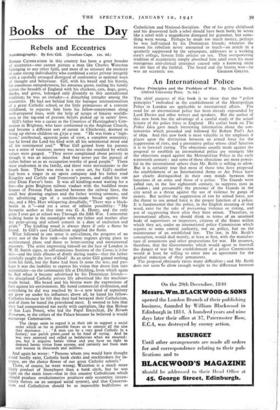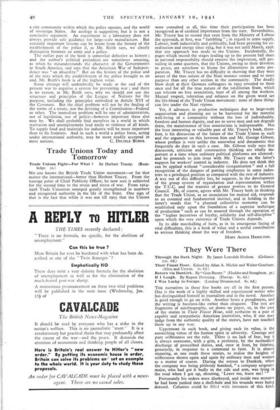An International Police
THE chief purpose of this book is to show that the " police principles " embodied in the establishment of the Metropolitan Police in London are applicable to international affairs. The need for an international police has been already expounded by Lord Davies and other writers and speakers. But the author of this new book has the advantage of a careful study of the actual history of the police force in England. His earlier book on The Police Idea gave much interesting information about the con- troversies which preceded and followed Sir Robert Peel's Act of 1829. And this new book is most valuable in the emphasis it places upon the distinction between an armed force for the suppression of riots, and a preventive police whose chief function it is to forestall rioting. The objections usually made against the proposal to establish an international police are strangely like the objections urged against the Metropolitan Police in the early nineteenth century : and some of those objections are more power- ful in the international sphere than Mr. Reith is willing to allow. But it is certainly true that most of those who have proposed the establishment of an International Army or Air Force have not clearly distinguished in their own minds between the functions of an army and those of a police. The Guards were called out, in the late eighteenth century, to suppress riots in London ; and presumably the presence of the Guards in the city acted as a threat against the use of violence by gangs of rioters. But neither the suppression of riot by armed force, nor the threat to use armed force is the proper function of a police. It is fundamental that the police, in the English meaning of that word, exist for the sake of preventing violence or rioting, and not of suppressing them after they have arisen. Therefore, in international affairs, we should think in terms of an unarmed body of supervisors or inspectors, citizens of the States within which they act, under an international police Commission which reports to some central authority, not on policy, but on the maintenance of an established law. The law, in Mr. Reith's conception, would deal mainly, at least at first, with the manufac- ture of armaments and other preparations for war. He assumes, therefore, that the Governments which would agree to forestall the danger of war by the establishment of a police Commission would at least be willing to enter into an agreement for the gradual reduction of their armaments.
The proposal obviously raises many difficulties ; and Mr. Reith i does not seem o allow enough weight to the difference between a city community within which the police operate, and the world of sovereign States. An analogy is suggestive; but it is not a conclusive argument. An experiment in a laboratory does not always provide safe guidance for large-scale manufacture. But certainly important lessons can be learnt from the history of the establishment of the police if, as Mr. Reith says, we clearly distinguish between an army and a police. The earlier part of the book is somewhat defective as history ; and the author's political prejudices are sometimes amusing, as when he misunderstands the character of the Governments in South America, and says that the American War of Indepen- dence was " an absurdity." But on the history of the police and of the riots which the establishment of the police brought to an end, Mr. Reith's book is of the highest value.
Some attempt will undoubtedly be made at the end of the present war to organise a system for preventing war ; and there is no reason, as Mr. Reith says, why we should not use the structure and principles of the League of Nations for the purpose, including the principles embodied in Article XVI of the Covenant. But the chief problem will not be the finding of the terms of a treaty, nor the devising of a Constitution—Federal or other. The immediate problem will be one of administration, not of legislation, nor of policy—however important these also may be. We shall probably find ourselves in a world in which starvation and unemployment lead easily to violence of all kinds. To supply food and materials for industry will be more important than to fix frontiers. And in such a world a police force, acting under international authority, may be more readily accepted in



























 Previous page
Previous page